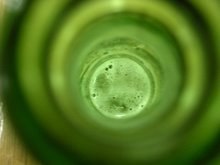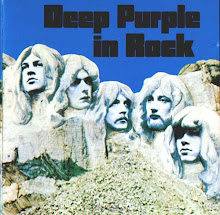The place where this Zen-like devotion, this quasi-religious awe I now have for the game first really crystallized was a pub in East Oxford called The Temple (yes, something very appropriate about the name, isn't there?).
In my first couple of years as an undergraduate, I lived in college, took a relatively serious (if never over-industrious) attitude toward my studies, and pursued a fairly conventional social life - dabbling in politics, debating, journalism, drama (in a barely-getting-the-toes-wet myself, but knowing-everybody-who-was-anybody kind of way). Then I just got terribly bored of it all (my studies especially; I had kept trying, and failing, to switch to a different course, and got miserably disillusioned with the whole business). Thereafter (and I managed to swing 4 more years there, since I was doing a 4-year undergraduate course, took a 'year out' to try to get my head together, and then went on to do a one-year teacher training course [in Durham, but it wasn't a very demanding programme, and I spent extended spells - including nearly the whole of the summer term - back in Oxford]), I lived in rented accommodation around the town, did just barely enough work to avoid being kicked out, renounced most of my former pursuits and the whole image of being "a student", and tried to live instead as a "townie" - hanging out in local pubs in rough parts of town most of the time rather than in college bars, or the Oxford Union Society, or town centre student-y bars, and making some local friends for the first time.
The Temple was the great discovery of this period, although I found it relatively late - I think, during the penultimate summer of my undergraduate career. I spent much of the following year there - visiting every week at least once, usually two or three times - and playing a lot of pool. It had all the elements of a great pub; it was almost, indeed, for me, The Perfect Pub: traditional decor, dark wood fittings & furniture, enfolding gloom (only one - frosted - bay window, right at the front of the very long bar area), wooden floorboards; a characterful landlord (a blunt, curmudgeonly Londoner called Eric, who ruled the place with a rod of iron; when he finally retired in the mid-90s, there was a sudden influx of unsavoury characters who had apparently been 'barred' by him during his reign); friendly dogs (in particular, a regular trio of beautiful border collies, one of them Eric's); excellent beer (the aptly-named 'Tanglefoot', an unusually light-coloured but exceptionally flavourful and deceptively strong bitter from a small brewery in Dorset, being my usual tipple of choice in those days; though there were other tempting options as well; Eric kept an excellent pint of Guinness...) and bar snacks (one of the few places where, in addition to the bog-standard crisps and nuts, you could reliably get very good pork scratchings and spicy poppadoms); a very fine juke-box selection (my favourite perk-me-up accompaniments to my pool-playing from those days were the inspiration for a number of my best compilation tapes); an engaging band of regulars (many of whom were in there pretty much every night; although I never really got to be on more than nodding terms with any of them, they did start to feel like "family" in a way: you observed their shifting fortunes with interest and sympathy [one couple split up, were apart for a long time, got back together again], felt the sense of loss when one of them moved away for good), most of whom came for the pool table.
Ah, that pool table. Wherever did they find it? Eric the landlord was himself, you see, a very keen player (although he would seldom allow himself a game during opening hours, other than sometimes very early or very late in the evening), and so, unlike with most pub tables that we have had to suffer over the years, he had taken great pains to find a really good one, to get it properly installed, to keep it reasonably well maintained, to make sure that it was level. It wasn't quite perfect, but it was streets ahead of almost any other pub table I've ever played on. And the really great thing about it was the cut of the pockets - god, they were tight! That was the really unusual thing, and I've no idea how Eric found such a table. Most pub tables, of course, are designed to be easy - the pockets gapingly wide and forgiving, so that games can be finished quickly. Well, these days, of course, most pub tables are coin-operated, which is driving that trend even further (and encouraging silly new 'rules' like being able to take the cueball 'in hand' after any foul!!). The Temple table was FREE. And it was bloody difficult. Even the most brilliant potters could rarely make shots into the corner unless the target ball was nicely placed on the mid-line of the pocket. 'Near misses' would look like embarrassingly huge cock-ups, the ball spilling way back out on to the table; 'very near misses' would stick fast in the jaws of the pocket, tying it up for you (usually!) until the 'endgame'. The tightness of the pockets dictated the tactics: it was unwise to go for big pots, to attempt large breaks; the winning approach was to be very, very patient, picking your balls off one at a time, developing your position slowly while frustrating your opponent with safety play, painstakingly seeking to cover each of the pockets in turn (or the corner ones at least) before attempting your final clearance. On most pub tables, good players can often finish a game in just a few minutes, and even duffers will rarely use up more than 10 minutes to conclude matters. In the Temple in those days, games regularly took 15-20 minutes to play out, and occasionally much longer even than that.
Those were some epic encounters. That is where I learned most of what I know about the game (until I met The Chairman, at least): about patience, self-discipline, determination, 'psychological warfare', about the importance of weighing up the strengths and weaknesses of your opponent's personality as well as his game. Those Temple regulars were a good test. They played more often than me. They knew the table far better than me. They knew each other far better than me. Most of them were better players than me (a few of them much better). But on my day, I could - and did - beat them all, because I learned how to out-think them, how to exploit their shortcomings (well, OK, yes, in many cases it was just a matter of waiting until drink took the edge off their concentration!).
It was a winner-stays-on table. I had a few good runs on there, but mostly against my student buddies who were not, for the most part, that good. I'd rarely managed to rack up more than 4 or 5 consecutive victories against the regulars. A couple of days before my Final exams, I arrived on the stroke of opening time at 7pm with three friends, and proceeded to 'warm up' by thrashing them a couple of times each. Then, after an hour or so the regulars started to show up - and I saw all of them off too. Just before closing time, we switched to playing doubles, and I still managed to win the final two games, the second of them against the intimidating landlord, Eric. I stayed on all night. I think that was 16 wins in all. 'Finals' seemed a complete irrelevance in comparison. That really was one of the greatest 'achievements', one of the most beautiful experiences in my life.
I suspect I shall return to reminiscences about The Temple again. It has an important place in my heart, in my soul. And there are so many great stories to tell about the place.






No comments:
Post a Comment